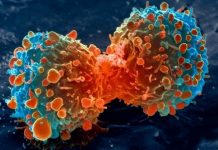Cancer research is a fast evolving field of medicine; and new developments and treatments that are constantly being created mean that even those with rare and incurable cancers may have hope that their cancer could find a cure in their lifetime.
At the Baylor College of Medicine, a recent breast cancer breakthrough may mean that it could be possible to get a cure without undergoing chemotherapy or surgery, and this could be significant for multitudes of women who have the disease.
 A combination of drugs were used in a study conducted by Dr. Mothaffar Rimawi, medical director of the Smith Breast Center, and Dr. Jenny Chang, director of the Methodist Cancer Center, on women who had HER2-positive tumors.
A combination of drugs were used in a study conducted by Dr. Mothaffar Rimawi, medical director of the Smith Breast Center, and Dr. Jenny Chang, director of the Methodist Cancer Center, on women who had HER2-positive tumors.
The drug used in the study is Lapatinib, which caused the HER1 and HER2 enzymes to be blocked, along with the drug trastuzumab, which also blocks the HER-2 protein.
While these drugs have been used by themselves before, this is the first time that their efficacy when taken together has been explored.
One of the study participants Maryann McCormick, found that her 8 cm tumor and aggressive stage three cancer had a dramatic improvement after 12 weeks of treatment. The tumor, after the treatment, had shrunk to less than 2 cm.
Researchers are hopeful that it may become possible to identify what feeds other kinds of cancer as well, so that those enzymes and proteins can be blocked. The idea is that each cancer sufferer should hopefully be able to have a cure or treatment procedure that is ideally suited to and particularly beneficial to them.
Another study conducted by the Aalto University has found how cancer killing peptides work, igniting hopes for better medical treatment for skin cancer, leukemia and even certain kinds of infections caused by resistant bacteria.
The aim of the study was to focus on identifying peptides that could target and kill off cancerous cells by damaging the lipid membrane of the cancer cells while other healthy cells around the cancerous cells remain healthy and unharmed.
The peptides that are actually the culprits in certain diseases; for instance neurodegenerative diseases like Alzheimer’s and Parkinson’s disease may actually be of benefit here, found researchers.
Cell death in the case of the disease can be detrimental, but when the peptides cause cell death of the cancerous cells, this is beneficial for the body. So researchers are hopeful that the study of these peptides will help not only defeat cancer, but also help in understanding neurodegenerative disease better.















